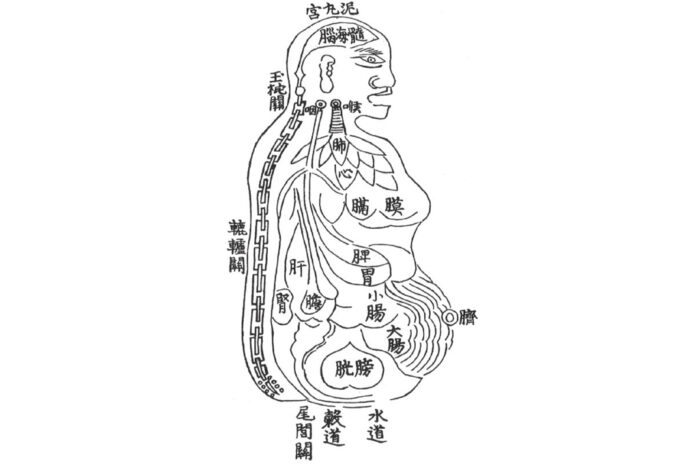Written By Jun Heo(許浚, 1539~1615), Translated by Namil Kim, Wung Seok Cha et al., Published by Ministry of Health & Welfare (Korea)
01. Doctors Should Know the Five Viscera 醫當識五臟六腑 의사는 오장육부를 알아야 한다
A wise man in the past lamented that “People study the creation of the universe but do not know the principles of how their own five viscera and six bowels, hair, muscles, and bones were originated. Would not it be the most importance for doctors to know these principles?!”
02 Yin and Yang of Viscera and Bowels 臟腑陰陽 장부의 음양
The Inner Classic (內經) says, “In terms of the five viscera and six bowels, the five viscera are yin and the six bowels are yang. The liver, the heart, spleen, lungs, and kidneys are the five viscera and yin. The gallbladder, stomach, small intestine, large intestine, bladder, and the triple energizer are the six bowels and yang.”
03 Five Viscera and Six Bowels Perform Different Functions 臟腑異用 오장과 육부는 다른 일을 한다
① Divine Pivot (靈樞) says, “The five viscera store essence, spirit, blood, qi, the ethereal soul, and the corporeal soul. The six bowels transform water and food to make fluid and humor flow.”
② The Inner Classic (內經) says, “The five viscera store essence and qi but do not discharge. Therefore, They are full but not filled. On the other hand, the six bowels digest food but do not store it. Thus, they are filled but not full. That is because when food enters the mouth and proceeds to the stomach, the stomach is filled, but the intestines are empty; and when food proceeds down, the intestines are filled but the stomach is empty.
③ The spleen, stomach, large intestine, small intestine, triple energizer, and bladder are the basis for the storage of water and food. They are also locations where nutrition stays. These are called receptacles. They change water and food into waste. They receive and transform the five tastes and excrete them.
04 Correspondence of Viscera and Bowels 臟腑有合 장부의 상합
Divine Pivot (靈樞) says, “The lungs correspond to the large intestine. The large intestine is the office of conveyance. The heart corresponds to the small intestine. The small intestine is the organ with a role of an official of receiving plenitude. The liver corresponds to the gallbladder. The gallbladder is the mediator organ. The spleen corresponds to the stomach. The stomach is the residence of water and grain. The kidneys correspond to the bladder.
The bladder is the house of body fluid. Lesser yin is connected to the kidneys. Since the kidneys are connected up to the lungs, lesser yin controls two organs. The triple energizer is the organ with water communication where the waterway originates from. It only corresponds to the bladder so it does not have a pair. This is how the six bowels correspond.”
05 Five Viscera Are Connected to the Seven Orifices 五臟通七竅 오장은 칠규와 통한다
Divine Pivot (靈樞) says, “The five viscera always control the seven orifices of the face. Lung qi corresponds to the nose so when lung qi is harmonized, the nose can smell. Heart qi corresponds to the tongue so when heart qi is harmonized, the tongue can differentiate taste. Liver qi corresponds to the eyes so when liver qi is harmonized, the eyes can differentiate the five colors. Spleen qi corresponds to the mouth so when spleen qi is harmonized, it can differentiate the five grains. Kidney qi corresponds to the ears so when kidney qi is harmonized, the ears can hear the five sounds.
When the five viscera are not harmonized, the seven orifices will be obstructed. If the six bowels are not harmonized, the pathogen will stay to form an abscess.”
06 Sense Organs of the Five Viscera 五臟有官 오장의 기관
Divine Pivot (靈樞) says, “The nose is the organ of the lungs. When the lungs are diseased, the person will experience dyspnea, and the nostrils will flare. The eyes are the organ of the liver. When the liver is diseased, the inner and outer canthus will become bluish. The mouth and lips are the organs of the spleen. When the spleen is diseased, the lips will become yellowish. The tongue is the organ of the heart. When the heart is diseased, the tongue will roll back and shorten and the cheek bones will become red.
The ears are the organ of the kidneys. When the kidneys are diseased, the cheek bones and face will become black and the ears will be dry.”
07 Size of the Five Viscera and Six Bowels 五臟有小大 오장의 대소
Divine Pivot (靈樞) says, ” If all five viscera are small, the person will easily be frightened and anxious. If all five viscera are big, the person will not be anxious and be able to perform jobs in a relaxed state. If all five viscera are located higher than normal, the person will want to work in a high position. If all five viscera are located lower than normal, the person will want to work under other people. If all five viscera are strong, the person will not have any disease. If all five viscera are weak, the person will always have disease. If all five viscera are tidy, the person will be gentle and will gain other people’s minds. If all five viscera are slanted, the person will have an evil mind and tend to steal, so the person is unjust and tends to change his or her word.”
08 There Are Also Nine Viscera 臟又有九 장에는 또 9가지가 있다
The Inner Classic (內經) says, “The five spirit organs and the four substantial organs add up to the nine organs. The liver stores the ethereal spirit, the heart stores the spirit, the spleen stores ideation, the lungs store the corporeal spirit, and the kidneys store will. These are the five spirit organs.
The four substantial organs are so called frame organs since they resemble a bowl with trim on the outside and empty inside, and with spaces within where objects can be stored. The first one is the corners of the forehead, the second ears and eyes, the third the mouth and teeth, and the fourth the chest. They are called the four substantial organs.
09 There Are Also Six Bowels 腑又有六 부에는 또 6가지가 있다
The Inner Classic (內經) says, “The brain, marrow, bones, blood vessels, gallbladder, and uterus are called the extraordinary bowels since they are produced by earthly qi. The Annotation says, “They are different from the six bowels.”
10 The Length of the Intestines and Stomach and the Amount of Food They Can Hold 腸胃之長水穀之數 장위의 길이 수곡을 받아들일 수 있는 양
Divine Pivot (靈樞) says, “The length of the stomach and intestines is five jang eight cheok four chon, and it can hold about nine mal two doe one and a half hop of food and water. This is the amount of food that the stomach and intestines can hold.”






































